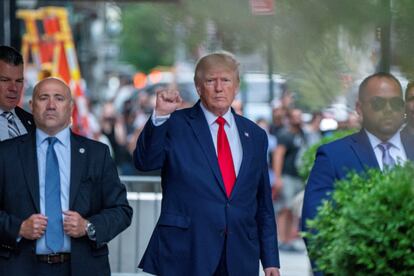Trump calls for ‘special master’ to review documents seized by FBI at Mar-a-Lago
According to ‘The New York Times,’ more than 300 classified files have been recovered from the former president’s Florida home

The legal team of former US president Donald Trump asked a federal court on Monday to temporarily block the FBI from reviewing the materials it seized on Aug. 8 from his Mar-a-Lago home until a “special master” can be appointed to oversee the review.
The call comes after The New York Times, citing several sources close to the investigation, reported that the US government has recovered more than 300 classified documents from Trump’s Florida home, including material from the CIA, the National Security Agency and the FBI.
An initial batch of more than 150 documents marked as classified was recovered by the US National Archives in January, the newspaper reported. Aides to Trump gave the US Justice Department a second set in June, while a third batch was seized in an FBI raid earlier this month in an operation attacked by Republicans as “political persecution.”
The motion filed by Trump’s lawyers claims the FBI search was overly broad and a “shockingly aggressive move,” pointing out that FBI agents broke into the former president’s safe. In addition to temporarily blocking the review, the motion asks that seized documentation “not within the scope” of the search warrant be returned to Trump.
The motion also recounts a message for US Attorney General Merrick Garland that Trump’s lawyers gave to a Justice Department official following the FBI search. “President Trump wants the attorney general to know that he has been hearing from people all over the country about the raid,” Trump’s message said, according to the lawsuit, as reported by CNN. “If there was one word to describe their mood, it is ‘angry.’ The heat is building up. The pressure is building up. Whatever I can do to take the heat down, to bring the pressure down, just let us know.”
The FBI search of Trump’s Florida home is part of a federal investigation into whether the former president illegally removed documents when he left office in January 2021 after losing the presidential election to Democrat Joe Biden. During its search, the FBI seized 11 sets of classified materials at Mar-a-Lago, some of which were labeled “top secret” – the highest level of classification reserved for the most closely held US national security information and which can only be viewed in special government facilities.
To justify the call to temporarily block the FBI from reviewing the material, Trump said that the documents were “illegally” obtained by agents.
“We have just filed a motion in the US District Court for the Southern District of Florida strongly asserting my rights, including under the Fourth Amendment of our Constitution, regarding the unnecessary, unwarranted, and unAmerican break-in by dozens of FBI agents, and others, of my home, Mar-a-Lago, in Palm Beach, Florida,” Trump said.
The FBI probe is not the only case Trump is facing. Two major investigations have also weakened the Republican. One is Congress’s investigation into the January 6 attack on the US Capitol instigated by Trump’s claims of election fraud and attempts to reverse the November 2020 election results. The other is an investigation initiated in 2019 by New York prosecutors into potential financial fraud and tax evasion by The Trump Organization and its officers.
In the former, Rudy Giuliani, Trump’s onetime personal lawyer, testified before a special grand jury in Atlanta on Wednesday. In the latter, Allen Weisselberg, the former chief financial officer at the Trump Organization, pleaded guilty last week to conspiring with the company in a 15-year tax fraud.
Two days after the Mar-a-Lago search, Trump declined to answer questions during an appearance before the New York state attorney general in a civil investigation into his family’s business practices.
Tu suscripción se está usando en otro dispositivo
¿Quieres añadir otro usuario a tu suscripción?
Si continúas leyendo en este dispositivo, no se podrá leer en el otro.
FlechaTu suscripción se está usando en otro dispositivo y solo puedes acceder a EL PAÍS desde un dispositivo a la vez.
Si quieres compartir tu cuenta, cambia tu suscripción a la modalidad Premium, así podrás añadir otro usuario. Cada uno accederá con su propia cuenta de email, lo que os permitirá personalizar vuestra experiencia en EL PAÍS.
¿Tienes una suscripción de empresa? Accede aquí para contratar más cuentas.
En el caso de no saber quién está usando tu cuenta, te recomendamos cambiar tu contraseña aquí.
Si decides continuar compartiendo tu cuenta, este mensaje se mostrará en tu dispositivo y en el de la otra persona que está usando tu cuenta de forma indefinida, afectando a tu experiencia de lectura. Puedes consultar aquí los términos y condiciones de la suscripción digital.








































